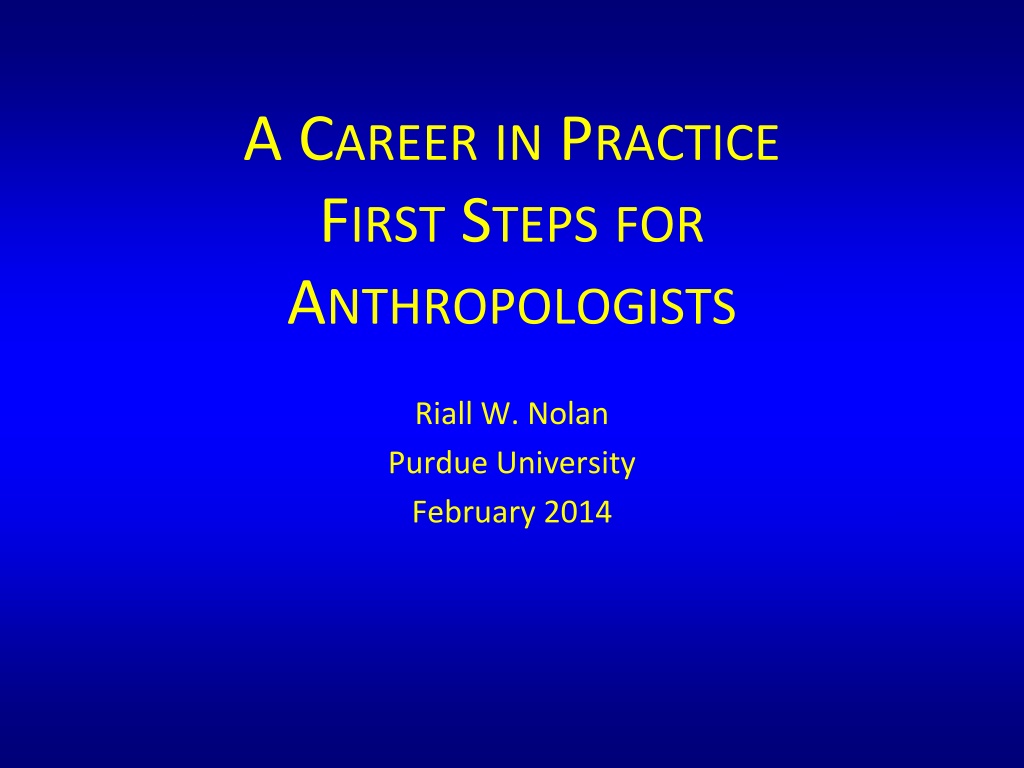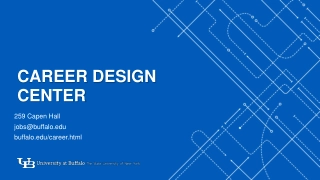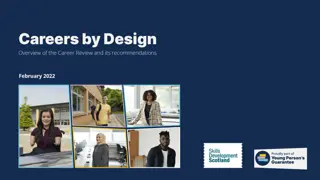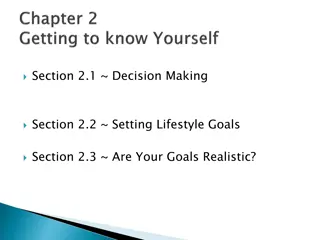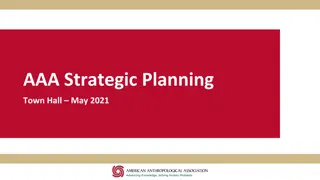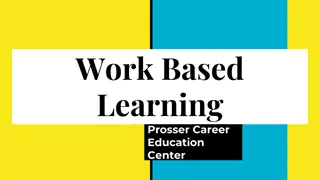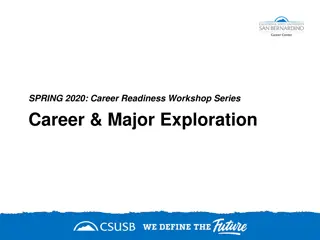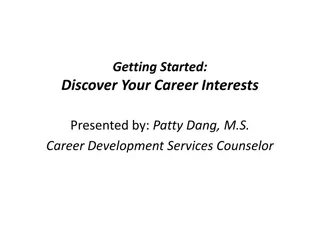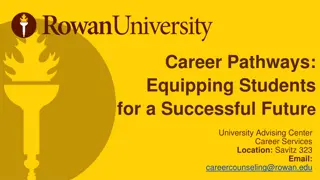Career Development for Anthropologists in Practice: Key Steps and Strategies
Explore the increasing opportunities for anthropologist practitioners in various sectors through this insightful webinar. Understand the structured discipline of applied, practicing, and academic anthropologists. Learn how practitioners think differently and the key characteristics of practice, along with practical steps to getting hired. Enhance your career prospects in anthropology by focusing on client-focused, result-driven work.
Download Presentation

Please find below an Image/Link to download the presentation.
The content on the website is provided AS IS for your information and personal use only. It may not be sold, licensed, or shared on other websites without obtaining consent from the author. Download presentation by click this link. If you encounter any issues during the download, it is possible that the publisher has removed the file from their server.
E N D
Presentation Transcript
A CAREER IN PRACTICE FIRST STEPS FOR ANTHROPOLOGISTS Riall W. Nolan Purdue University February 2014
WHY THIS WEBINAR? There are more opportunities for anthropologist practitioners than ever before. Practice is the largest and fastest-growing sector of anthropology, and demand is increasing. At the same time, training in anthropology does not usually emphasize the practice option As a result, some of our best anthropologists are not well prepared for the demands of practice.
HOW OUR DISCIPLINE IS STRUCTURED Applied Anthropologists Practicing Anthropologists Academic Anthropologists Inside the University Outside the University
PRACTITIONERS THINKA LITTLE DIFFERENTLY FROM ACADEMICS It isn t just what you know, it s what you can do with what you know Commitment to, and acceptance of, social science as a mechanism for change and improvement Orientation toward client problems and opportunities Willingness and ability to work with diverse others toward solutions
HOW PRACTICEIS STRUCTURED Freelancer Business Head Main Practice Options or Bases Private-sector employee Public-sector employee University Employee Non-profit employee
KEY CHARACTERISTICSOF PRACTICE Orientation to change and improvement Primarily client-focused Collaboration with others New learning/new specializations More than just research Work inside organizations Work as a series of projects Significant problems, real consequences Responsibility for results
RESULTS MEANSGETTING THINGS DONE Solving problems Producing results Getting along with people Helping them to get along with each other Generating and using resources efficiently Finding new and better ways to do things
THREE SIMPLE STEPS TO GETTING HIRED Visioning Networking Info. Interviewing 1. Get on the List SWOT Analysis Portfolio Prep. More Networking More Info. Interviewing 2. Stay on the List Interviewing Negotiating 3. Get Chosen
STARTING POINTS: YOUR CAREER VISION Your Values What things do you feel strongly about? How do you strive to live? What do you respect in others? Your Interests What do you like to do? What do you already know a lot about? What would you like to know more about? What general area do you want to work in? Sector Where do you want to be located? Setting What do you see yourself doing? Function Your Skills What can you do that is useful in several different areas? What things do you think you re particularly good at doing? Who are you working for? What type of organization is it? Base
COMPONENTSOFA PRACTITIONERS JOB Base: Sector: Function: Government Corporate Non-Profit Freelance/Sole proprietorship Small business University Social services Public administration Agriculture Environment Int l development Manufacturing Education Marketing Planning Management Production/implementation Design Evaluation/assessment Data collection/analysis Needs assessment Advocacy Policy formulation
ANTHROPOLOGICAL SKILLSINTHE JOB QUEST You know how to quickly find relevant data and extract its significance. You can pick up the salient points of local culture in a setting or organization. You are not daunted by difference. Instead, you re curious about it. You are skilled at asking good questions. You are comfortable with ambiguity. You can modify your frameworks as you learn. You re not just interested in answers. You re also interested in what the questions are.
NETWORKING TO IDENTIFY OPPORTUNITIES Networking provides connections, information, advice, and access: Introduces you to role models and mentors Provides guidance as you search for organizations and opportunities Allows you to safely test your assumptions and expectations against reality Can provide an entr e into specific agencies
ANTHROPOLOGICAL METHODS YOULL FIND USEFULINTHE JOB HUNT Domain Analysis: figuring out how grad programs are defined, structured, and arranged, and identifying the values and concepts which drive them. Informational Interviewing: figuring out what the right questions to ask are, and how to ask them. And then figuring out what the answers mean. Life Histories: looking at the career arcs of students in the program, and afterwards.
RESEARCHING ORGANIZATIONS THROUGH INFORMATIONAL INTERVIEWING What does this organization do and how does it do it? What are working conditions like here? What qualifications do you need to work here? How do they make hiring decisions?
DOINGA SWOT SCAN INTERNAL FACTORS EXTERNAL FACTORS Strengths Weaknesses Comparative Advantage Mobilization Opportunities Investment/ Divestment Damage Control Threats
PUTTING TOGETHER YOUR RESUME A resume is not a CV It is a brief account of your skills and accomplishments It has only one purpose: to get you an interview It is not about you: it is about you in relation to someone else and their needs
CREATING YOUR RESUME The best predictor of future performance is past performance Therefore, stress what you have accomplished, not just what you know Of particular value: Presentation and communication skills Project and team management experience Creative leadership and problem-solving A range of research skills The ability to get things done
INTERVIEWS: WHAT THEY WILL ASK YOU Why did you come to us specifically? What are you seeking from us? What do you already know about us? Why are you here? What makes you stand out? What are your key strengths, and how do these relate to what we do and what we need? What do you bring? What s it going to be like to work with you? How will you fit in with who s already here? Is there anything about you we need to know? What are you like? Apart from the money, what else will we need to provide, or change, if we bring you on board? Do you have particular needs or preferences? What will it cost us?
EXPLAINING YOURSELFINTHE INTERVIEW Pick 3-6 of your best accomplishments. Include difficult or challenging situations. For each: Outline the problem, tasks, issues or opportunities Describe your strategy or approach Explain the skills and abilities you used Emphasize the anthropology in what you did Describe the outcomes you achieved Your actions are central to the story, but be sure to acknowledge the work of others. Connect your examples to your listeners needs.
WHAT DO ANTHROPOLOGISTS CONTRIBUTE? Social knowledge we put culture into the picture Contextualization and integration we look further, for broader connections Synergy we work well with other disciplines: e.g., engineering, medicine Versatility -- we don t just do research we plan, design, and manage. Innovative -- we often find things that others miss. Social -- we are very good at working with people.
FURTHER RESOURCES AAA Career Center: http://www.aaanet.org/profdev/ and http://www.aaanet.org/resources/practitioners CoPAPIA Report Nolan, Anthropology in Practice Nolan (ed), Handbook of Practicing Anthropology Briller Kedia, Domains of Practice etc
